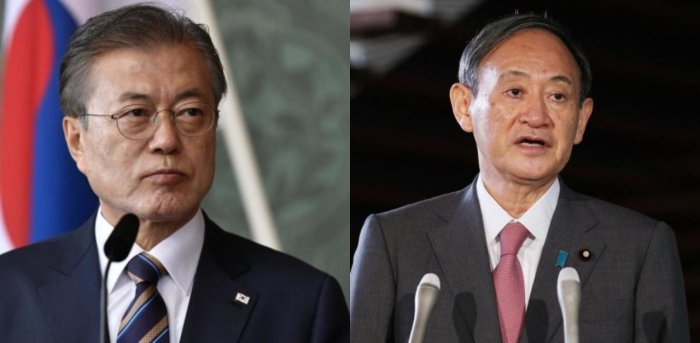Former Japanese PM Shinzo Abe remains one of the biggest anti-China hawks amongst the present generation of world leaders. As such, Abe foresaw growing Chinese aggression and also understood the need to let go all previous conflicts with regional powers like Russia and South Korea with the sole purpose of creating a joint front against Beijing.
Suga too has continued Abe’s legacy of focusing entirely on China and diffusing age-old conflicts with other Asian powers.
For Tokyo, the biggest challenge however is to befriend Seoul. Both South Korea and Japan are US allies, and both of them face security challenges from China. Yet, the two countries share a bitter wartime history. To complicate things further, the Moon administration in South Korea doesn’t seem capable of striking rapprochement with Japan. Tokyo has lost hope in the Moon administration and is waiting for a conservative government in the country to take things forward.
Particularly after Trump’s electoral defeat last year, the South Korean President Moon Jae-in has warmed up to China. As such, Moon’s actions have annoyed Japan and there is visible disinterest within Tokyo on the issue of negotiating with the present administration in Seoul.
A recent decision of the Seoul Central District Court did offer some hope of improving Japan-Korea ties. The Court dismissed a suit filed by Korean victims of wartime sexual servitude- the so called military “comfort women”.
However, there is not any signal of coordinated action by Tokyo and Seoul for the purpose of improving bilateral relations. The Japanese government has been giving a cold shoulder to South Korea, simply because the Moon administration isn’t taking enough action to shut down legal challenges over “comfort women” and forced labourers.
These legal actions have not allowed the two countries to move beyond their bitter wartime history, even though it is understood that cooperation between South Korea and Japan is crucial for meeting contemporary challenges posed by Beijing.
Japanese officials have therefore assumed that the Moon administration is good for nothing and they are now pinning their hopes on the election of a conservative regime next year.
South Korean foreign minister Yu Myung Hwan, who is an expert on Japan-South Korea relations and had also served as Korean Ambassador to Japan, said, “It is unlikely that the Korean government would change its positions and suggest mutually agreeable solutions to Japan.”
It is clear that Seoul has to initiate any improvement in the bilateral ties between South Korea and Japan. The fact remains that legal challenges to the bitter legacy of wartime history between the countries is pending in South Korea. The thorny issues of compensation to Korean women victims and forced labourers will have to be resolved in South Korea, before Tokyo and Seoul can discuss their bilateral relationship.
Tokyo has high hopes with a conservative government, because even in 2015, the Japanese government and Park Geun-Hye’s previous conservative government in South Korea had attempted settlement of the issue of compensation and apology to the so-called “comfort women”.
The 2015 settlement was partly successful with two-thirds of the surviving victims accepting compensation from a Japanese fund, along with an expression of apology. The legal challenge in South Korea was however filed by an organisation representing those who rejected the 2015 settlement.
While dismissing the legal challenge, Justice Min Seong-Cheol did refer to the 2015 settlement. However, the matter is appealable and it seems that the Moon administration is unlikely to explore an amicable solution to the emotive issue.
Japan is not belittling the pain and agony that Korean victims had to go through during the Second World War. But it is simply not prudent for South Korea and Japan to keep a decades-old conflict alive at a time when the two nations are faced by a multitude of common security challenges. Japan and South Korea will have to find a way out of the current impasse, if not with the Moon administration, then hopefully after a change of government in South Korea next year.
